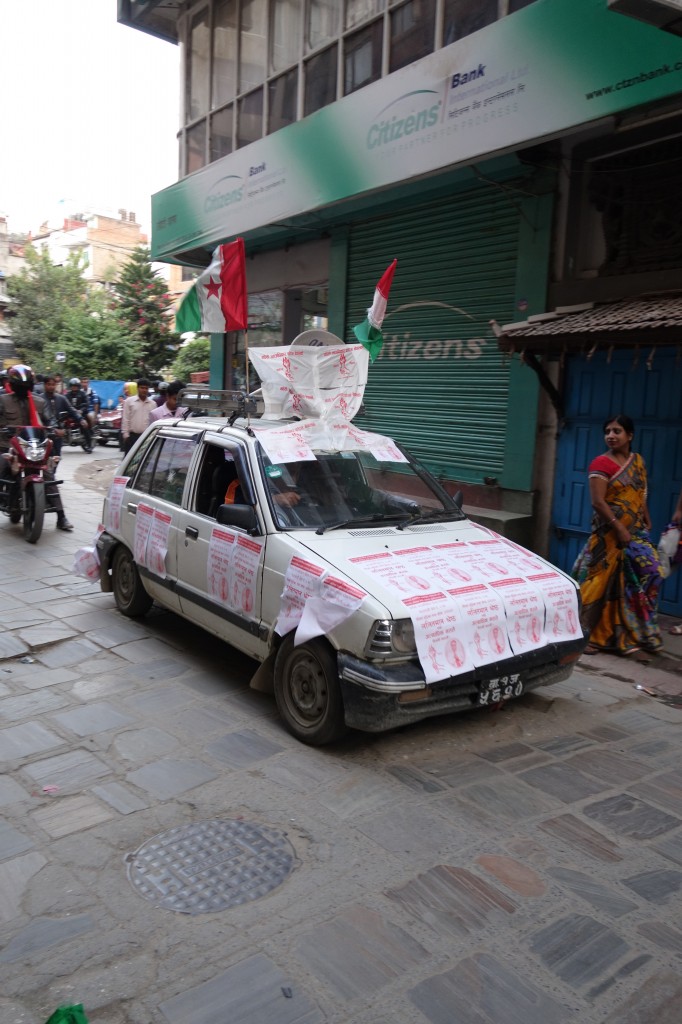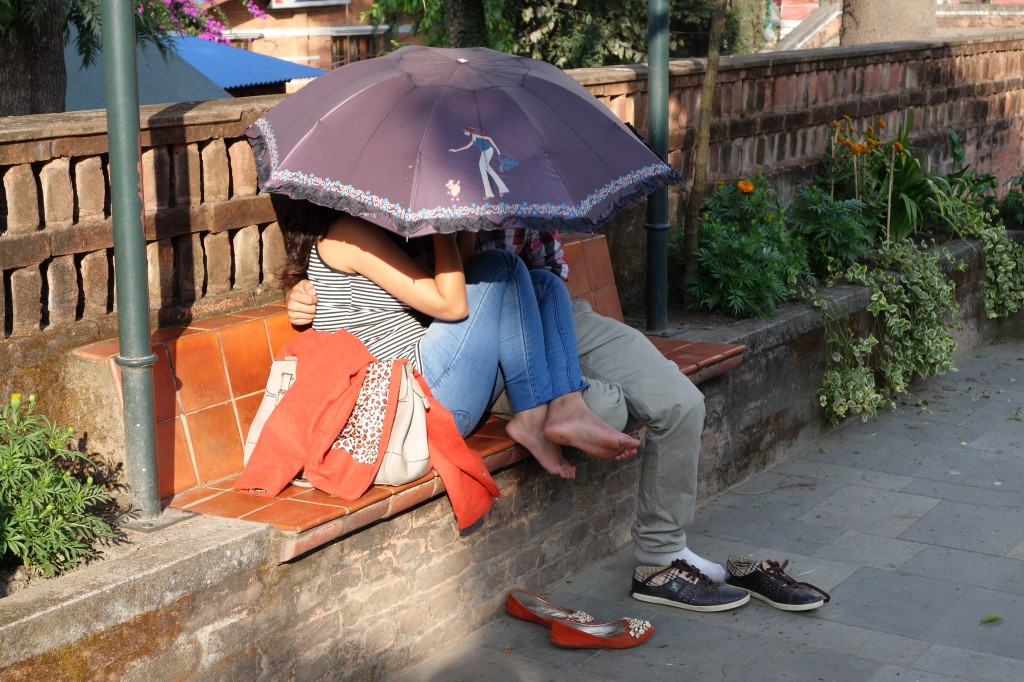Kathmandu: Lots of dust and stray dogs

Through the 90s and into the early 2000s, as the government of Sri Lanka fought to put down the LTTE (Tamil Tigers), the monarchy in Nepal sought to contain the Maoists (communists) who were gaining support in the countryside and not surprisingly wanted the monarchy abolished. The dalits (untouchables under the caste system) in particular were drawn to communism as it promised them rights and social mobility that the Hindu monarchy would never deliver.
In 2001 the Maoists received an unexpected boost from a multiple homicide. Crown Prince Dipendra went on a drunken shooting spree in the royal palace in Kathmandu, committing patricide, matricide, fratricide, sororicide, regicide, avunculicide and eventually suicide. You can probably guess at the meanings of all the -cide suffix words, but the long and short of it is that he massacred the entire royal family in a span of minutes, turning his Franchi shotgun on himself at the end (one of four weapons he used, the other three being a Colt M16, H&K MP5 and Glock 19), and leaving Nepal in a bit of a quandary. You see, while the masses had loved their gunned down king Birendra and even the homicidal crown prince (who bizarrely enough still became king for a few days while he was in coma, before dying), the brother of the king who assumed the throne after the carnage was a deeply unpopular figure, a man compared to Scar from The Lion King. So why did Crown Prince Dipendra go Billy Bezerk? Allegedly because his parents, the king and queen, would not allow him to marry the girl he desired. When she heard about this, the slutty French princess from Braveheart asked her handmaiden “Now that’s love, no?”.
One thing led to another and in 2008, King Scar stepped down and left the palace for a two bedroom apartment in Kathmandu. Nepal became a federal democratic republic, ending 240 years of monarchy. The Maoists won the first election, turning Nepal into a communists-headed state, but they were unable to pass a constitution without an outright majority and facing a divided parliament. This brings us to today. Five governments have risen and fallen since 2008, and the biggest election since then just happened now, while we were there. This was very annoying. Nepal has over 100 political parties and they campaign very loudly. Picture tiny cars with massive roof mounted speakers blaring shouting men all day. They also enforced strikes which disrupted services and transportation that we planned on using, messing up our plans more than once. Initial results indicate a centrist party has won these elections with the Maoists in third place. The Maoists are claiming vote-rigging and boycotting the results, but international observers on the ground, including Jimmy Carter and EU observers, are hailing the elections as open and fair.
Arriving into Kathmandu airport at night, I had been pleasantly surprised by how efficiently my $40 visa on arrival was processed. On the drive to the hotel, the first thing that grabbed my attention was the exact same thing that first grabbed my attention when I visited Colombo in 2010, the strong army and police presence on the streets several years after the conclusion of the conflict that necessitated it. I found this distasteful – the government knows that security has dramatically improved but instead of reallocating those resources to better serve the people of Nepal, they keep martial law and other extraordinary powers intact, even after the conclusion of the extraordinary times for which they were authorized. Why? Because it gives them extraordinary powers at the expense of freedom, justice, transparency, democracy, but most importantly their political opponents.
Our car pulled up behind a stopped police/military mobile (pickup) on a narrow unpaved road. Beyond the billowing columns of dust illuminated by our headlights, I saw a small middle aged woman frantically talking to a man in military fatigues with a large metal pot in his hand. He was trying to get the pot to the mobile and the distressed lady was trying her best to block him. It became apparent that the pot belonged to her, that she was a street food vendor, and that her livelihood was about to be confiscated. Maybe she didn’t grease the cop/soldier’s palm that week, or maybe there was a legitimate legal reason, I couldn’t tell either way. We stayed parked behind the mobile watching this scene unfold for a minute, after which my driver nervously gave a short honk of the horn. No one acknowledged us, not the lady, not the man holding her pot, nor his two companions also decked in camo and holding large canes. So we sat some more and watched on. One quick move to the left and the cop/soldier got around her, placing the pot on the bed of the pickup. With a face representing the dictionary definition of pleading, that probably couldn’t physically plead one iota more, the distraught woman with her expression and words, although we couldn’t hear them, drew attention to her desperation and to those who depended on her income, and begged for leniency, placing one hand on his shoulder. For the cop/soldier, the shoulder grab was the last straw. He turned around, and putting his whole body into it, shoved the woman away. She stumbled back a good distance and would probably have fallen backwards if she didn’t first hit what was most likely her own rickety wooden food stall. For the first time, she was silent, her face covered in shock, but no one cared. The cop/soldier hopped back into the mobile and drove away while his two comrades continued their patrols, canes held out as they walked, just so it was clear these were kicking ass sticks, not walking sticks. I didn’t come away with a good impression from watching this incident.
But an almost simultaneous thought was how much better security would be in Karachi with this kind of police and army presence. I mean, here they are in the absence of crime, and in Karachi crime runs rampant in the absence of a credible display of the state’s ability to enforce law and order. I guess the lesson is to avoid extraordinary powers unless they are absolutely necessary, and to make it crystal clear and non-negotiable in the authorization bill when (under what conditions) they must be removed.
Kathmandu’s streets are narrow, congested and badly paved, often unpaved. Walking through busy markets and tourist alleys is at first unnerving as there’s always a Bajaj Pulsar nipping at your heels or barreling straight at you. Soon you learn to accept near misses with speeding motorbikes as the norm and get on with the business of enjoying the Capital. It’s noisy, busy and polluted, but then that’s par for the course in South Asia. Visitors from Dhaka, Colombo, Karachi or Mumbai will feel at home but shouldn’t expect to see any tall shiny buildings. In fact I thought even Kabul looked more developed than Kathmandu, despite Afghanistan being the only country in Asia poorer than Nepal (by GDP/capita at PPP). The air pollution is so bad that you’ll need to buy a face-mask and even then you’ll cough, there’s litter everywhere, and stray dogs hold barking competitions late into the night when you’re trying to sleep.
At this point you may be wondering what’s there to enjoy. There’s plenty, but really the main thing most travelers use Kathmandu for is transit to either Pokhara or a Himalayan Trek. Please stay tuned. More on that later.


Recent Comments